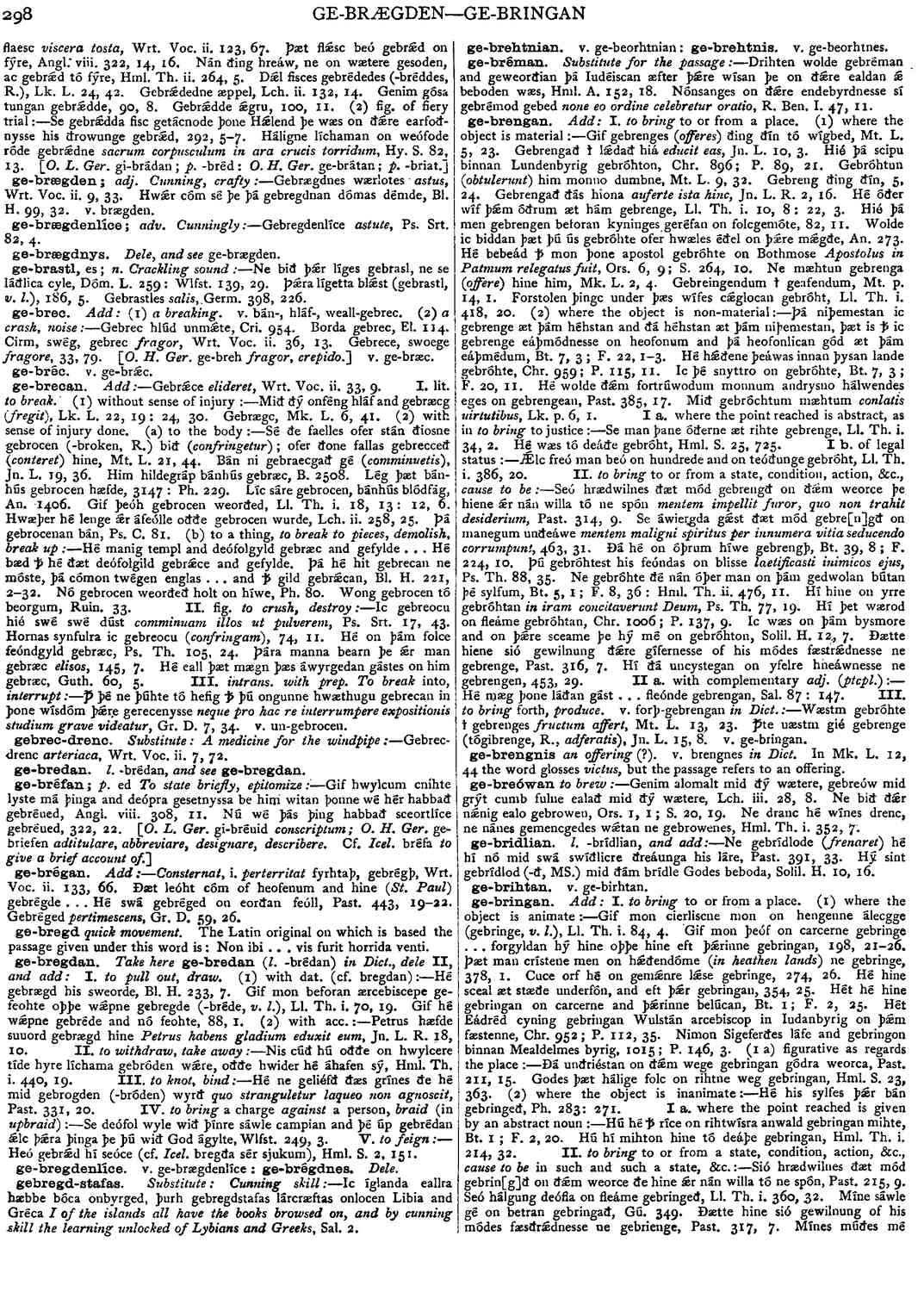ge-brengan
- adjective
-
Gif gebrenges
(offeres)
ðing ð ín tó wígbed,- Mt. L. 5, 23.
-
Gebrengað ł lǽdað hiá
educit eas,
- Jn. L. 10, 3.
-
Hié þá scipu binnan Lundenbyrig gebróhton,
- Chr. 896; P. 89, 21.
-
Gebróhtun
(obtulerunt)
him monno dumbne,- Mt. L. 9, 32.
-
Gebreng ðing ðín,
- 5, 24.
-
Gebrengað ðás hiona
auferte ista hinc,
- Jn. L. R. 2, 16.
-
Hé óðer wíf þǽm óðrum æt hám gebrenge,
- Ll. Th. i. 10, 8: 22, 3.
-
Hié þá men gebrengen beforan kyninges geréfan on folcgemóte,
- 82, 11.
- Wolde ic biddan þæt þu ús gebróhte ofer hwæles éðel on þǽre mǽgðe. An. 273.
-
Hé bebeád ꝥ mon þone apostol gebróhte on Bothmose
Apostolus in Patmum relegatus fuit,
- Ors. 6, 9; S. 264, 10.
-
Ne mæhtun gebrenga
(offere)
hine him,- Mk. L. 2, 4.
-
Gebreingendum ł genfendum,
- Mt. p. 14, 1.
-
Forstolen þingc under þæs wífes cǽglocan gebróht,
- Ll. Th. i. 418, 20.
-
Þá niþemestan ic gebrenge æt þám hehstan and ðá hehstan æt þám niþemestan, þæt is ꝥ ic gebrenge eáþmódnesse on heofonum and þá heofonlican gód æt þám eáþmédum,
- Bt. 7, 3 ; F. 22, 1-3.
- Hé hǽðene þeáwas innan þysan lande gebróhte. Chr. 959; P. 115, 11.
-
Ic þé snyttro on gebróhte,
- Bt. 7, 3 ; F. 20, 11.
- Hé wolde ðǽm fortrúwodum monnum andrysno hálwendes eges on gebrengean. Past. 385, 17.
-
Mið gebróchtum mæhtum conlatis uirtutibus, Lk. p. 6, 1. I a. where the point reached is abstract, as in to bring to justice :-- Se man þane óðerne æt rihte gebrenge. Ll.
Th. i.
- 34, 2.
-
Hé wæs tó deáðe gebróht,
- Hml. S. 25, 725.
- I b. of legal status :---
-
Seó hrædwilnes ðæt mod gebrengð on ðǽm weorce þe hiene ǽr nán willa tó ne spón
mentem impellit furor, quo non trahit desiderium,
- Past. 314, 9.
-
Se áwiergda gǽst ðæt mod gebre[n]gð on manegum unðeáwe
mentem maligni spiritus per innumera vitia seducendo corrumpunt,
- 463, 31.
-
Ðá hé on óþrum híwe gebrengþ,
- Bt. 39, 8 ; F. 224, 10.
-
Þ ú gebróhtest his feóndas on blisse
laetificasti inimicos ejus,
- Ps. Th. 88, 35.
-
Ne gebróhte ðé nán óþer man on þám gedwolan bútan þé sylfum,
- Bt. 5, 1; F. 8, 36 : Hml. Th. ii. 476, 11.
-
Hí hine on yrre gebróhtan
in iram concitaverunt Deum,
- Ps. Th. 77, 19.
-
Hí þet wærod on fleáme gebróhtan,
- Chr. 1006; P. 137, 9.
-
Ic wæs on þám bysmore and on þǽre sceame þe hý mé on gebróhton,
- Solil. H. 12, 7.
-
Ðætte hiene sió gewilnung ðǽre gífernesse of his módes fæstrǽdnesse ne gebrenge,
- Past. 316, 7.
-
Hí ðá uncystegan on yfelre hneáwnesse ne gebrengen, 453, 29. II a. with complementary
adj. (ptcpl.)
:-- Hé mæg þone láðan gást . . . fleónde gebrengan.- Sal. 87 : 147.
-
Wæstm gebróhte ł gebrenges
frustum affert. Mt. L. 13, 23. ꝥte uæstm gié gebrenge (tógibrenge, R., adferatis )
.- Jn. L. 15, 8.
Bosworth, Joseph. “ge-brengan.” In An Anglo-Saxon Dictionary Online, edited by Thomas Northcote Toller, Christ Sean, and Ondřej Tichy. Prague: Faculty of Arts, Charles University, 2014. https://bosworthtoller.com/47334.
Checked: 0